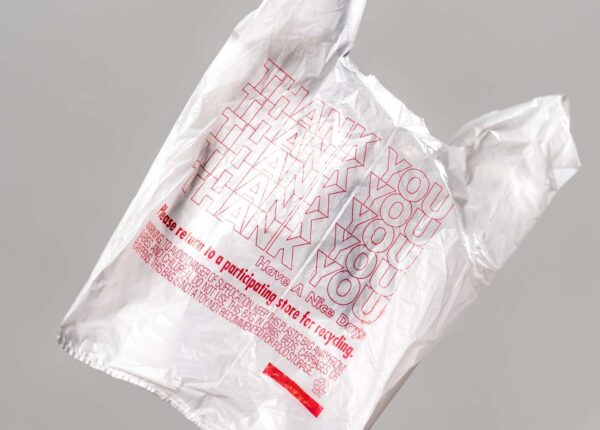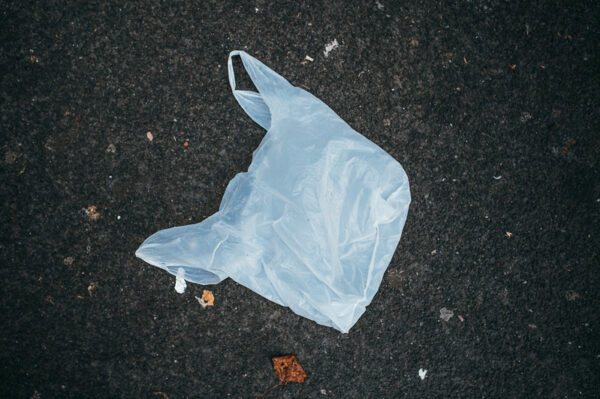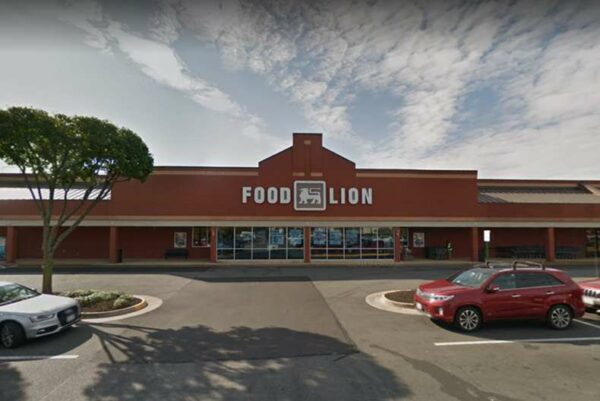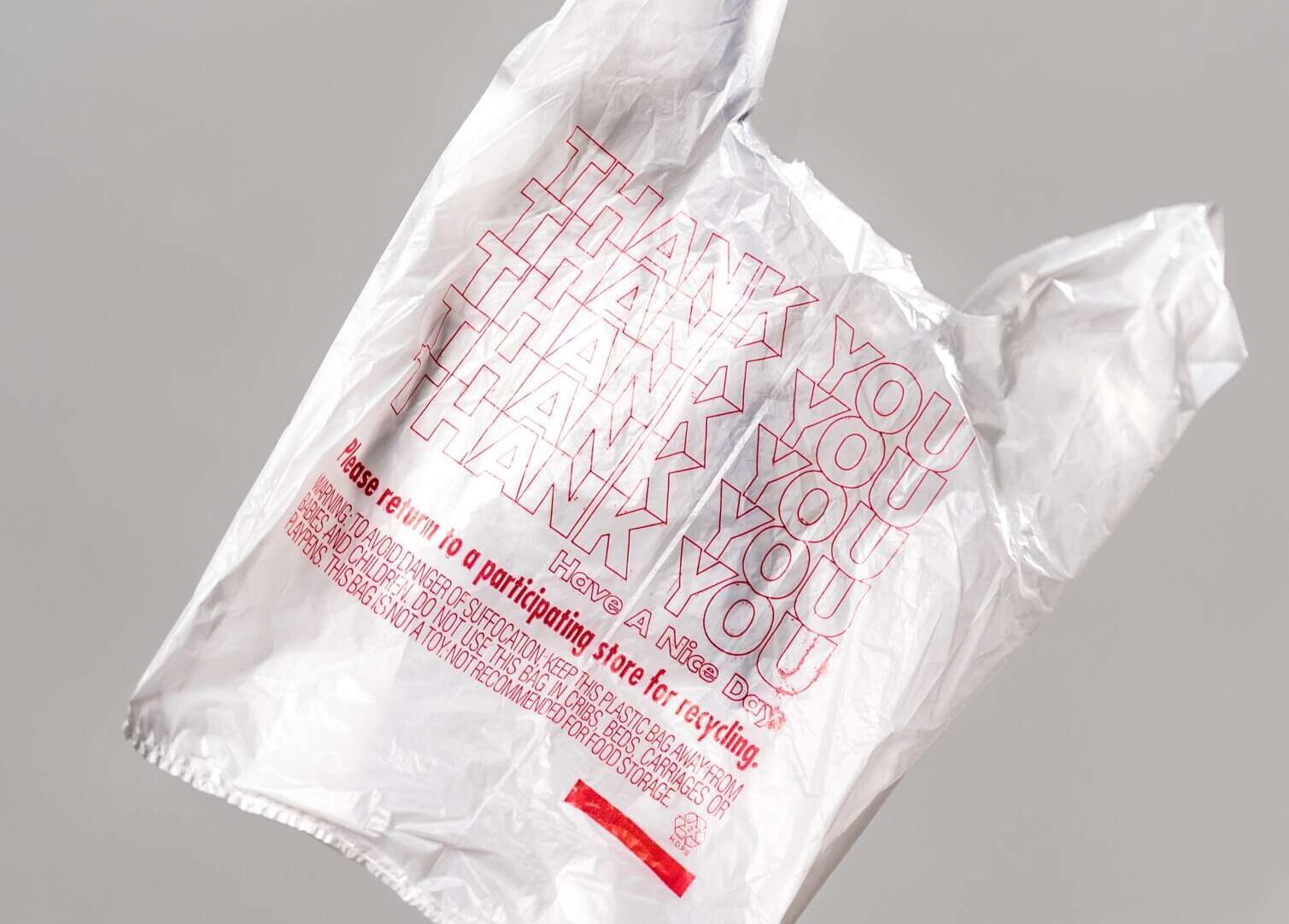
Fairfax County is on track to bring in more than $1 million in revenue from the first year of its plastic bag tax.
In the first five months after the tax took effect on Jan. 1, the county government received over $500,000, the Office of Environmental and Energy Coordination said in a memo to the Board of Supervisors.
That’s even with retailers allowed to retain two out of every five cents collected on each disposable plastic bag they distribute in 2022, a provision intended to offset the costs of transitioning away from plastic for businesses.
The OEEC projects that the tax will generate $1.2 million for the county over its inaugural year.
“Revenue is likely to fluctuate in the first few years of implementation,” OEEC Director Kambiz Agazi wrote to the board, noting that the amount of the tax retained by retailers will drop to one cent on Jan. 1, 2023. “…As has been observed in other jurisdictions with a plastic bag tax, over the long term, tax revenue is likely to trend downward as consumers begin reducing their use of disposable plastic bags.”
The revenue that the county has “regrettably” collected so far suggests many community members haven’t gotten into the habit yet of bringing their own bags to grocery stores and other businesses, Mount Vernon District Supervisor Dan Storck observed yesterday (Tuesday) at the end of the board’s environmental committee meeting.
By a matter of days, Fairfax County became the first locality in Northern Virginia to adopt a plastic bag tax in September. The 5-cent levy was enabled by a 2020 state law and is supposed to encourage people to use more sustainable alternatives.
Under the law, revenue can be used to support educational programs, clean up pollution and litter, and provide reusable bags to people who receive federal Supplemental Nutrition Assistance Program (SNAP) or Women, Infants and Children (WIC) food benefits.
In his memo, Agazi proposes allocating $511,000 already accrued from the tax to existing county programs, including:
- Operation Stream Shield, which pays people experiencing homelessness to help clean up local streams ($370,000)
- Storm drain education and labeling projects ($70,000)
- Maintenance activities by the Community Labor Force, which the sheriff’s office says will be suspended in September ($30,000)
The plan also designates funding for technology that collects litter in county waterways, gloves and other materials for volunteer stream cleanups, and reusable bags for SNAP and WIC recipients, food pantries, and farmers’ markets.
For future beneficiaries, staff proposed having a formal process where county agencies apply for funding. A project selection committee would prioritize the submitted projects, which would then be reviewed by the county’s chief financial officer and Department of Management and Budget.
In addition to meeting the state criteria for the plastic bag tax, the projects would have to be based in the county or part of a regional initiative that directly benefits the county and scheduled to start in the same year that money is requested. They also can’t require new, permanent staff positions, be part of the capital improvement program, or have other sources of funding.
“This is an opportunity for us to repurpose those funds, if you will, to hopefully make a difference in our environmental management,” Storck said.
Photo via Christopher Vega/Unsplash

When the new year starts, plastic bags will come with a new price tag.
Fairfax County’s 5-cent tax on single-use plastic bags will take effect for the first time on Saturday (Jan. 1). The fee will also be introduced in Arlington County and the City of Alexandria.
The towns of Herndon and Vienna are included, but the City of Falls Church passed its own ordinance that will begin April 1.
Virginia’s new law, passed in 2020, allows localities to introduce the tax starting in 2022. Research has shown that introducing such a fee influences consumers, helping promote environmental friendly behavior.
Although stores must pay the tax, they can still give plastic bags away for free. However, a sampling of companies by FFXnow suggests customers at various chains can expect to pay at stores ranging from Giant to Harris Teeter.
Wegmans stopped providing disposable plastic bags to customers at its four Fairfax County stores in early December, offering 5-cent paper bags instead.
Big box chains that include products beyond just groceries are also affected, according to Fairfax County. Walmart didn’t initially respond to a message seeking comment for its plans.
Target said it will charge customers for the bags, but it has a longstanding policy that rewards shoppers for bringing their own bags.
“In an effort to promote the use of reusable bags and keep more plastic bags out of landfills, Target gives guests a five-cent discount for each reusable bag used at all of our stores,” spokesperson Shane Kitzman said in an email. “For example, if a guest uses five reusable bags, they will receive a $0.25 discount on their purchase.”
Besides grocery stores, convenience stores and drugstores are also subject to the tax.
The money will be used for environmental cleanup programs, pollution and litter mitigation programs, education programs on environmental waste reduction and providing reusable bags to recipients of food stamps and Women, Infants, and Children (WIC) program benefits.
Customers will continue to be able to donate plastic bags for recycling at major chains such as Giant, Harris Teeter, and Target. Bins are available in the front of stores.
Fairfax County advises people not to place plastic bags into recycling bins because the items can jam and entangle sorting equipment and conveyor belts and contaminate other grades of plastic being recycled at its facility.
The plastic bags tax doesn’t apply to heavy duty plastic bags, bags used to wrap fish, meat, bulk food items and certain other foods as well as plastic bags used to carry dry cleaning, prescription drugs or garbage/leaf/pet waste packages.
Photo via Ivan Radic/Flickr

Fairfax County’s new plastic bag tax, set to take effect on Jan. 1, drew both support and opposition from the supermarket industry.
Food Lion and MOM’s Organic Market took opposite stances on the issue before the Fairfax County Board of Supervisors approved the change last Tuesday (Sept. 14), imposing a 5-cent tax on each disposable plastic bag provided at grocery stores, convenient stores, and drug stores.
“While Food Lion strongly supports responsible stewardship and waste reduction efforts, complying with a patchwork of varying local single-use bag restrictions in the Commonwealth negatively impacts Food Lion’s ability to serve our customers and implement uniform brand strategies for waste reduction and recycling,” the company said in a letter shared by Springfield District Supervisor Pat Herrity, the only board member who voted against the measure.
Headquartered in Salisbury, N.C., Food Lion has one store in Fairfax County, located in a shopping center in Herndon.
The company’s director of operations, Eric Sword, said in the emailed statement to the county that the business recycled 6,914 tons of plastic in 2020, among other recycling efforts, and it’s working to meet a parent company goal to make all plastic packaging fully reusable, recyclable, or compostable by 2025.
“Food Lion is supportive of broad-based efforts to reduce customer usage of both paper and plastic bags, and the brand continuously works to raise customer awareness of the value of using reusable bags,” the letter said.
However, Sword wrote that he believes the change will shift consumer behavior almost entirely to paper bags, even though the company seeks to encourage reusable bags for customers.
Meanwhile, a MOM’s representative noted during the Sept. 14 public hearing that their business voluntarily banned plastic bags over a decade ago and uses paper and compostable bags.
“We banned plastic bags 15 years ago because it was the right thing to do for the environment and the communities we call home,” Alexandra DySard, the company’s environment and partnership manager, said in video testimony.
The Rockville, Maryland-based supermarket, which has stores in Herndon and the Mosaic District in Merrifield, favors alternatives to a plastic bag that many people might only use for 12 minutes, DySard said.
“Plastic manufacturers are misleading consumers to believe that bags are being upcycled into benches and decks when the truth is the majority of plastic bags are being sent to landfills, incinerators, ending up in our waterways, or being shipped out of sight to third-world countries,” DySard said.
She also noted that D.C. saw a 72% reduction in plastic bags found in streams after its ban took effect in 2010.
FFXnow contacted other grocery chains in the area for comment, including Giant, Safeway, and Harris Teeter, but did not receive responses by press time.
The Board of Supervisors ultimately approved the new tax 9-1, as advocates likened it to a fee that people can avoid and expressed hope that the move will encourage consumers’ environmental stewardship.
“Plastic bag taxes are proven in jurisdictions across the nation,” said Braddock District Supervisor James Walkinshaw, who introduced the measure. “This measure will reduce plastic pollution and the modest funds collected will be reinvested into litter prevention and to providing reusable bags for low-income community members.”
Herrity dissented, saying in newsletters sent to constituents before and after the vote that now is not the time to add another tax.
“Instead of instituting a rigorous education campaign — one that encompasses how to recycle and dispose of multiple forms of trash — the Board is taxing residents into compliance,” Herrity said, suggesting the county needs to “create more ways for people to recycle and more materials to educate them on how they can” do so.
The county hasn’t allocated the future tax revenue to a specific purpose yet, but state law permits it to be used for pollution and litter mitigation, educational programs about reducing waste, and reusable bags for residents who receive federal food assistance benefits.
The tax doesn’t apply to:
- multiple bags sold in packages, such as those for garbage, leaves or pet waste
- plastic bags used solely for certain food products such as ice cream, meat, fish, poultry, produce, unwrapped bulk food items, or perishable food items
- plastic bags with handles designed for multiple reuse
- plastic bags for dry cleaning or prescription drugs
With the board’s vote last week, Fairfax County was the first Northern Virginia locality to institute a plastic bag tax, but neighboring Arlington County and the City of Alexandria quickly followed suit, adopting their own ordinances on Saturday (Sept. 18).
Photo via Google Maps

Fairfax County will require certain businesses, but not all, to pay taxes on disposable plastic bags in a move to encourage customers to use reusable bags.
The Board of Supervisors passed the measure yesterday (Tuesday) after a new state law gave counties and cities the authority to begin imposing a 5-cent tax starting in 2021. The tax will take effect on Jan. 1, 2022 for Fairfax County.
In a statement released after the vote, Board of Supervisors Chairman Jeff McKay acknowledged the challenges of introducing a new tax while the county continues to grapple with the COVID-19 pandemic, but he says the impact of plastic bags on the environment “is too great” to not act.
“There are simple steps residents can take to avoid the over-use of disposable plastic bags,” he said. “A small fee on plastic bags is an opportunity for residents to look at their habits while providing the County with avenues for environmental cleanup, education, and access to environmentally friendly alternatives.”
Fairfax County is the first locality in Northern Virginia to adopt a plastic bag tax, according to Braddock District Supervisor James Walkinshaw’s office. Walkinshaw initiated a board motion to pursue the issue in July as part of a joint effort with McKay and Mount Vernon District Supervisor Dan Storck.
Consistent with the state law, the tax applies to grocery stores, convenience stores and drug stores, but there are exemptions for reusable plastic bags, bags used for perishable food to prevent damage or contamination, bags that carry prescription drugs or dry cleaning, and bags sold in bulk, such as garbage bags.
“Plastic bags frequently end up in a landfill, where it can take more than 500 years for the bag to disintegrate. Many plastic bags end up in our streams,” Fairfax County Office of Environmental and Energy Coordination Deputy Director Susan Hafeli said. “While the impact on human health is still being addressed, there is evidence that humans ingest and inhale thousands of microplastics per year, which result in the breakdown of disposable plastic bags and other plastic products.”
The Office of Environmental and Energy Coordination says the tax is intended to influence consumer behavior by discouraging consumers from using single-use disposable plastic bags.
According to the Environmental Protection Agency, the U.S. uses over 380 billion plastic bags and wraps yearly, requiring 12 million barrels of oil to create. Turtles, one of several aquatic creatures that suffer from the trash, die of starvation after eating them.
The Board of Supervisors approved the measure 9-1 with Springfield District Supervisor Pat Herrity — the lone Republican member — opposing it. He said food banks reported relying on the bags to distribute food and argued that it’s the wrong time to add any tax. Read More

